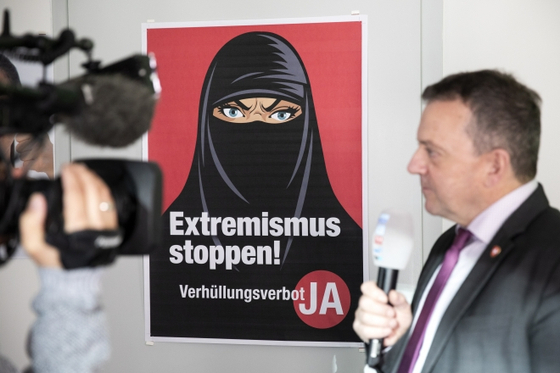In Switzerland, it is also forbidden to wear clothes that cover the entire face in public places such as restaurants and public transport. This was aimed at the burka or nikab, the traditional clothes of Muslim women.
![On the 7th (local time), Swiss Nationalist Congressman Balto Boffman is conducting a broadcast interview with a campaign poster that says'Stop extremism'. [EPA=연합뉴스]](https://i0.wp.com/pds.joins.com/news/component/htmlphoto_mmdata/202103/08/6e2012b2-354b-4557-b2b5-56457e027802.jpg?w=560&ssl=1)
On the 7th (local time), Swiss Nationalist Congressman Balto Boffman is conducting a broadcast interview with a campaign poster that says’Stop extremism’. [EPA=연합뉴스]
According to the Reuters news agency on the 7th (local time), in the Swiss referendum on the introduction of a constitutional provision prohibiting covering faces entirely in public places, the vote in favor of the Swiss referendum surpassed the opposition (48.8%) with 51.2%.
Accordingly, it is forbidden to cover faces in public places, except for chapels, to the extent that identification is difficult. In case of violation, a fine of up to 10,000 Swiss francs (about 12 million won) is imposed. However, wearing a mask is an exception to the prevention of Corona 19. Exceptions include covering faces for security, climate or health reasons.
![Switzerland protests against the Burka ban [EPA=연합뉴스]](https://i0.wp.com/pds.joins.com/news/component/htmlphoto_mmdata/202103/08/e7598ebf-47fa-4379-adba-f75d38b512bf.jpg?w=560&ssl=1)
Switzerland protests against the Burka ban [EPA=연합뉴스]
The introduction of this provision, called the so-called’Burkha Prohibition Act’, has been confronting pros and cons in Switzerland. Although Burka or Nikab was not directly mentioned in the provisions of the law, the Swiss Nationalist Party, which led the introduction, launched a public opinion war with slogans such as’blocking excessive Islamism’.
The nicap is a form that only exposes the eyes, and the burka covers the eyes with a net.
“Burkha and Niqab are extreme forms of Islam, and this is a matter of civilization, not discrimination,” said Jean-Luc Ador, the head of the Swiss National Party, who led the dress restrictions. “Citizens of liberal countries do not hide their faces.” Insisted.
![Muslim women wearing nicaps. [로이터=연합뉴스]](https://i0.wp.com/pds.joins.com/news/component/htmlphoto_mmdata/202103/08/abfde931-b707-4d0e-b774-d2fb1dfa337c.jpg?w=560&ssl=1)
Muslim women wearing nicaps. [로이터=연합뉴스]
However, Islamic groups in Switzerland are protesting against Muslims, saying they are stigmatizing extremism. Despite the fact that there are only a few dozen people in Switzerland wearing burkans or nicaps, it was political motive that even created the ban. The Swiss government was also opposed to the total ban, citing concerns about a decline in Muslim tourists.
In the meantime, individual prohibitions were enforced only in some areas, such as St. Gallen and Ticino Canton. According to a 2019 survey by the Swiss Federal Bureau of Statistics, the number of Muslims in Switzerland is 5.5% of the total population, which is not high in Europe, but the number is steadily increasing.
In Europe, starting with France in 2011, the Netherlands, Denmark, Germany, Bulgaria, and Austria have implemented laws that completely or partially ban clothing that covers the entire face in public places.
Reporter Kim Hong-bum [email protected]
![]()
